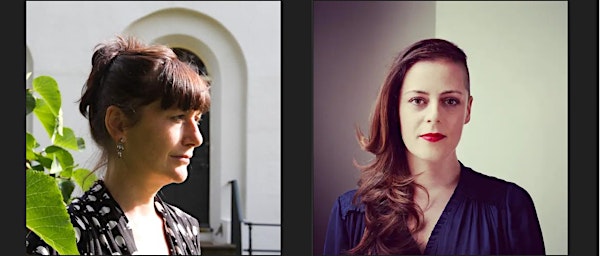
UCC Creative Writing Reading Series: Martina Evans & Annemarie Ní Churreáin
You are invited to an evening of captivating poetry with Martina Evans & Annemarie Ní Churreáin at the UCC Creative Writing Reading Series
Date and time
Location
West Wing
West Wing Cork IrelandAbout this event
- 1 hour 30 minutes
UCC Creative Writing Reader Series hosted by The School of English and Digital Humanities
Wednesday, May 1st
West Wing 6, 6:30pm
The Quadrangle
University College Cork
About the Speakers:
Annemarie Ní Churreáin is a poet from the Donegal Gaeltacht, Ireland. Her books include Bloodroot (Doire Press, 2017), Town (The Salvage Press, 2018) and The Poison Glen (The Gallery Press, 2021). She is a recipient of the Irish Arts Council’s Next Generation Artist Award and a co-recipient of The Markievicz Award. Ní Churreáin has held literary fellowships in the U.S. and throughout Europe. She was the 2022-23 Decades of Centenaries Artist in Residence at Donegal County Archives. Ní Churreáin is the Poetry Editor at The Stinging Fly Magazine.
About The Poison Glen: The story of the stolen or missing child sits at the heart of The Poison Glen, alongside a desire to bear witness to family loss and cultures of silence in Ireland. Weaving together landscape, history, and the compelling mythology of a Donegal site known as ‘The Poison Glen’, here are poems of grit and burning, of wildness, grace and magic, of dreaming and compassion. The collection is rooted by ‘The Foundling Crib’, a poem that dwells on a long-gone Foundling Hospital in Dublin, accompanied by poems written as responses to sites of various Irish church- and state-run institutions.
In poems both tender and ferocious the book illuminates questions that run deep in the Irish psyche. Ultimately it asks, How can darkness be overcome by light?
********
Martina Evans is an Irish poet, novelist and teacher. She grew up in County Cork in a country pub, shop and petrol station and is the youngest of ten children.
She is the author of twelve books of prose and poetry. Her first novel, Midnight Feast, won a Betty Trask Award in 1995 and her third novel, No Drinking No Dancing No Doctors (Bloomsbury, 2000), won an Arts Council England Award in 1999. Martina's fourth poetry collection, Facing the Public was published by Anvil Press in September 2009 and has won bursary awards from both the Irish Arts Council (An Chomhairle Eiraíon) and Arts Council England. Facing the Public was a TLS Book of the Year in 2009 and won the Premio Ciampi International Prize for Poetry in 2011. Petrol, a prose poem won a Grants for the Arts Award in 2010 and was published by Anvil Press in 2012. A revised edition of Midnight Feast and Through The Glass Mountain, a new prose poem, were published by Bloom Books in June 2013. Burnfort, Las Vegas (Anvil Press 2014) was shortlisted for the Irish Times Poetry Now Award 2015. Mountainy Men, a new narrative poem, was the recipient of a Grants for the Arts Award in 2015 and Watch, a pamphlet, published by Rack Press in January 2016 was a Poetry Society Book Choice. The Windows of Graceland: New & Selected Poems was published by Carcanet in May 2016. Now We Can Talk Openly About Men was published by Carcanet in May 2018. It featured in the Times Literary Supplement, Observer and Irish Times Books of the Year and has been shortlisted for the 2019 Irish Times Poetry Now Award as well as the Pigott Poetry Award. Her latest collection American Mules (Carcanet 2021) won the Pigott Poetry Prize 2022 and was a TLS and Sunday Independent Book of the Year.
About The Coming Thing: The Coming Thing is a brilliant long narrative poem. It is not Evans's first: she has become celebrated for work on this scale, spoken, dramatic, abundant. She has been justly acclaimed by, among others, Colm Tóibín. He says of her inimitable narrative style, 'Slowly, a poem that seems animated by random thoughts and images takes on a strange, concentrated power; the lines begin to feel like pure style, the narrative voice holding and wielding the hidden energies that Martina Evans consolidates, and then releases with such energy and confidence and verve.'
Imelda, the book's central character, is immersed in challenging new worlds where old customs still somehow survive. It is the 1980s and the poem takes shape among punks in Cork City. The 'coming thing' refers to the arrival of computers which were taking hold and beginning to effect their transformations of data and then of lives; but ultimately the title identifies the abortion which Imelda will have in a Brixton clinic.
Imelda, who Evans's regular readers will recall from her earlier narrative Petrol (2012), narrates the story with a light touch, even when the book's preoccupation with abortion, suicide and euthanasia provides a strong and compelling undertow. The Coming Thing looks hard at the duplicity surrounding received ideas about the sacredness of human life and how economic change runs counter to the values of 'old' Ireland.